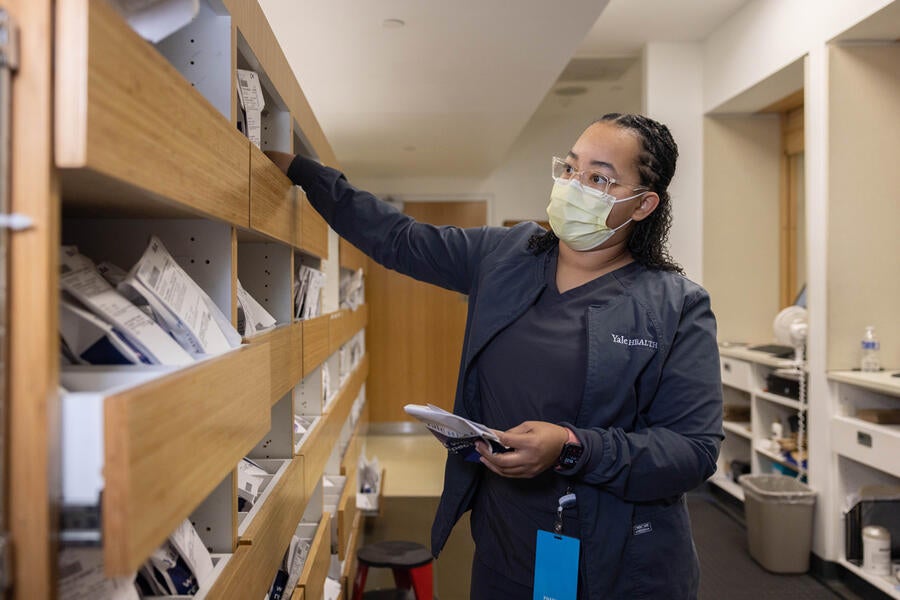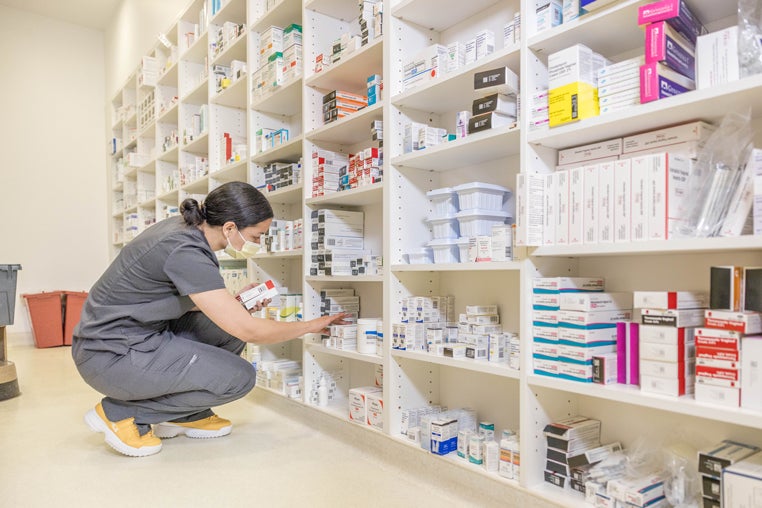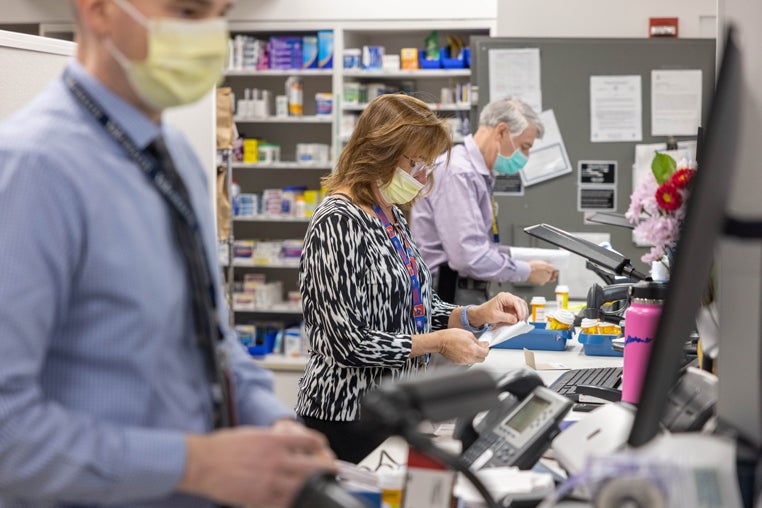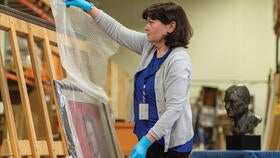
At 8:00 a.m. one recent morning, Yale Health Pharmacy staff welcomed early customers to their space on the first floor of the Yale Health Center — at this time of day, mostly staff or faculty stopping by to pick up prescriptions or consult with a pharmacist before heading to work. Behind the four retail windows, pharmacists reviewed electronic prescription requests while others answered calls, and a large robotic dispenser— which fills each prescription bottle with the correct number and type of pills, caps it, and adheres a label — churned in the background. “Your refill is ready,” a pharmacy technician called out to a seated customer.
This clinic-based non-profit pharmacy serves the approximately 46,000 students, employees, dependents, and retirees who are members of Yale Health — the university’s on-campus, non-profit HMO and care provider, established in 1971. Yale Health’s unique campus model encompasses the entire Yale community, including patients who range in age from newborns to nonagenarians and providers who are themselves university employees. Within this holistic and collaborative health care system, the pharmacy plays a key role.
“The Yale Health Pharmacy supports a multifaceted organization that integrates care delivery and coverage,” says Nanci J. Fortgang, interim director and chief clinical operations officer for Yale Health. “Our pharmacy team has a long-standing dedication to support the mission and goals of promoting health care for the Yale community and achieving our goals of clinical excellence.”
The scope of work exceeds the typical offerings of a retail pharmacy. In addition to dispensing prescriptions (225,000 of them in 2022), the Yale Health Pharmacy staff — twelve pharmacists and fourteen technicians — provides specialized medical treatments through anti-coagulation and infusion suites and consults directly with both physicians and patients. They also manage four automatic disbursement cabinets for Yale Health’s three clinics (endoscopy, acute care, and the infirmary), which use barcoding technology to allow the nursing staff to access medication once a provider has placed an administration order.
“Our pharmacists are very accessible to the members in times of great need and stress — to listen, guide, or triage with them and their health care provider,” says Bryan Cretella, director of pharmacy and medication management. “They play a vital role in the health care system.”
 Migdalys Acevedo, a technician at the pharmacy; Photo by Robert DeSanto
Migdalys Acevedo, a technician at the pharmacy; Photo by Robert DeSanto
Responsiveness and flexibility
A community spirit pervades the pharmacy. “I have a strong connection with the patients/members,” says Carol Blum, a pharmacy technician. “Individuals will come up and show me pictures of their grandkids or tell me about their recent vacation.”
In the retail pharmacy world, companies may say they are patient-centered, but here at Yale, we really are.
“All conversations on developing workflow or anything else start and end with how to best serve our patients,” says John Florentino, operations manager for the pharmacy. “In the retail pharmacy world, companies may say they are patient-centered, but here at Yale, we really are.”
The staff’s ability to pivot quickly to meet new needs was both challenged and confirmed by the COVID-19 pandemic. “At the beginning of the pandemic, things were happening at lightning speed, and we had to quickly come up with new solutions to maintain services for our members,” says Bryan, who became director in February of 2020. “Our main focus was to continue to provide critical pharmacy services while ensuring the safety of our employees and members.”
The pharmacy developed several new programs to get prescriptions to their customers safely, including curbside pickup, mail-order options (within Connecticut), and daily courier deliveries to students who were in isolation. (Curbside pickup has been made a permanent service.)
Bryan and his team also adapted to a growing infrastructure related to COVID-19 testing and, eventually, vaccine provision. They helped acquire and distribute rapid antigen at-home tests, helped procure and store vaccines, and partnered with nursing and other university personnel to coordinate vaccination clinics.
In his role as the primary liaison between Yale leadership and the Connecticut Department of Public Health (DPH), Bryan coordinated support from many departments, including the donation of sub-zero freezers for the vaccination clinic from labs across the university. “We had to prove we could properly store the vaccines before [DPH] would ship them to us,” says Bryan. Yale was one of the first non-hospital entities in Connecticut to meet the DPH’s requirements to receive the COVID-19 vaccine for distribution.
The Yale COVID-19 Vaccination Program, initially based at the Lanman Center in Payne Whitney Gymnasium, administered its first vaccinations in December of 2020. “The idea of different people across the campus coming together to accomplish a goal fills me with a sense of pride, and it gives me the chills to think about the collective effort that made it happen,” says Bryan.
 pharmacists Jared Laviano, Carmen Suedmeier, and Bill Narducci; Photo by Robert DeSanto
pharmacists Jared Laviano, Carmen Suedmeier, and Bill Narducci; Photo by Robert DeSanto
Holistic care and specialized expertise
The pharmacy team represents a wide range of skills and experience, employing four types of pharmacists: outpatient/community, clinical-care, managed-care, and ambulatory. “Most retail pharmacies have only outpatient pharmacists,” says Bryan. “Because we are part of the larger Yale Health clinic, there is a need for clinical, managed-care, and ambulatory-care pharmacists.”
The outpatient/community pharmacist ensures individuals receive the correct medication and dosage based on their medical diagnosis. Clinical pharmacists and technicians support the infusion suite — providing sterile compounded medications mixed in a clean room and later administered by the nursing team — and Yale Health’s anti-coagulation clinic, for patients who have been prescribed blood thinners.
The managed-care pharmacists optimize medication use and ensure that patients receive safe, effective, and cost-efficient drug therapy — providing high-quality care while managing healthcare costs for the organization. Finally, an ambulatory pharmacist works with the internal medicine department to manage chronic diseases, such as diabetes.
Bryan and his team also work closely with Yale Health leadership to develop plans for public health crises — including supporting the new Campus Health Office, which promotes campus health and safety in the event of both routine conditions and emergent risks.
“Post-COVID, we continue to look at ways to provide not just good but great overall care for our members. As an in-house pharmacy, we’ve removed barriers of location and preauthorization which, in the end, saves time and keeps costs down,” Bryan says. “Helping our members achieve their healthcare goals by providing safe and effective medication options is our utmost priority.”
Located on the first floor of the Yale Health building, the Yale Health Pharmacy is open Monday – Friday 8:00 a.m. to 6:00 p.m. and Saturday 8:00 a.m. to 3:00 p.m.
Yale Health members can request a prescription refill and have it mailed to their home with Magellan Rx Home Delivery or picked up curbside. Members can also call the pharmacy at 203-432-0033 to request refills.






